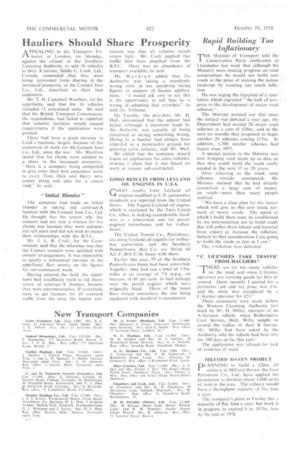Hauliers Should Share Prosperity
Page 42

If you've noticed an error in this article please click here to report it so we can fix it.
A PPEALING to the Transport TriPA boned in London, on Monday, against the refusal of the Northern Licensing Authority to add 16 vehicles to their A licence, Sieldle.C. Cook, Ltd., Consett, contended that they were being prevented from sharing in the increased prosperity of the Consett Iron Co., Ltd., described as their . best customers.
Mr. T. H. Campbell Wardlaw, for the appellants, said that the 16 vehicles included 12 articulated units.. • He said that the British Transport Commission, the respondents, had failed to establish that suitable facilities would exceed requirements if the application were granted.
There had been a great increase in Cook's business, largely because of the expansion of work for the Conseil Iron Co., Ltd., since the war. Mr. Wardlaw stated that his clients were entitled to a share in the increased prosperity. " Here is a company being compelled to give away their best customers' work to every Tom, Dick and Harry who comes along and asks for a return load,he said.
" Initial Blunder" The company had made an initial blunder in taking out contract-A licences with the Consett Iron Co., Ltd, He thought that the reason why the concern had not sent a witness for his clients was because they were substantialrail users and did not wish to impair their relationships with the B.T.C.
Mr. .1. L. R. Croft, for the Coolmission, said that the inference was that the Consett concern were satisfied with present arrangements. It was impossible to justify a substantial increase in the appellants' fleet merely on the figures for sub-contracted work.
Having entered the field, the appellants had steadfastly tried to rid themselves of contract-A licences because they were on remunerative. If everybody were to get licences for all outward traffic from the area, the logical con
elusion was that all vehicles would return light. MT. Croft implied that traffic had been poached. from the B:T.C. .there was an abundance of transport available, he said.
Mr. Wardlaw• added that the Authority was taking a manifestly wrong view innot accepting hiring figures in support of licence applications. " I would ask you to say this is the opportunity to tell. him he is wrong in adopting that principle," he told the Tribunal.
On Tuesday the president, Mr. H. Hull, announced that the appeal had failed, although a statement -made by the Authority was capable of being construed as saying something wrong. Hiring by a haulier had always been regarded as a permissible ground for granting extra vehicles, said Mr. Hull.
He added that the company should frame an application for extra vehicles. Making it plain that it was based on work at present sub-contracted.
GOOD RESULTS FROM LEYLAND OIL ENGINES IN U.S.A.
GOOD results from Leyland oil engines modified to U.S. automotive standards are reported from the United States. The Fageol-Leyland oil engine, which is marketed by the Twin Coach Co., Ohio, is making considerable headway as a conversion unit for petrolengined motorbuses, and for trolleybuses.
The United Transit Co., Providence, are using Leyland oil engiti for trolley' bits conversion, and the Southern Pennsylvania Bus Co. are fitting 60 A.C.F.-Bril C-36 buses with them.
Earlier this year, 55 of the Southern Pennsylvania buses had been converted. Together, they had run a total of 1.9m. miles at an average of 7.4 m.p.g., an increase of 81 per cent, in fuel mileage over the petrol engines which were originally fitted. Three of the buses have torque converters, the rest being equipped with standard transmissions.












































































































